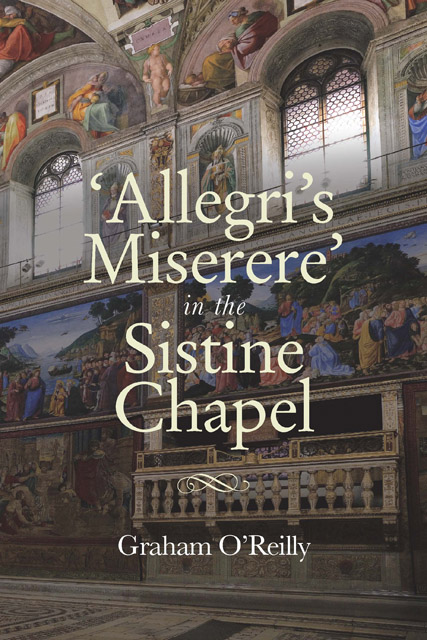Book contents
- Frontmatter
- Contents
- List of illustrations
- List of tables
- List of music examples
- Acknowledgments
- Note on the text
- Introduction: myth and reality
- Part One The Sixteenth and Seventeenth Centuries
- Part Two The Eighteenth Century
- Part Three The Nineteenth Century
- Part Four Performing the Miserere in the Twentieth Century
- Part Five Appendices, Editions and Notes
- List of appendices
- Bibliography
- Index
13 - The current ‘popular’ version of ‘the Allegri’: the ‘English Miserere’
Published online by Cambridge University Press: 13 January 2023
- Frontmatter
- Contents
- List of illustrations
- List of tables
- List of music examples
- Acknowledgments
- Note on the text
- Introduction: myth and reality
- Part One The Sixteenth and Seventeenth Centuries
- Part Two The Eighteenth Century
- Part Three The Nineteenth Century
- Part Four Performing the Miserere in the Twentieth Century
- Part Five Appendices, Editions and Notes
- List of appendices
- Bibliography
- Index
Summary
The five-part verses
In the version generally heard nowadays, verses 1, 5, 9, 13, 17 and the first part of 20 (for five voices) and the second part of 20 (for nine voices) come directly from Burney’s 1711 publication (La musica che si canta annualmente nelle Funzioni della Settimana Santa nella Cappella Pontificale). Although this is similar in many respects to the identical Sistine Chapel manuscripts CS 185 (of 1731) and CS 341 (of 1748), there are nonetheless important differences which merit discussion.
Burney seems to have been confused by the different versions he was shown in Rome.
This composition used to be held so sacred, that it was imagined excommunication would be the consequence of an attempt to transcribe it. Padre Martini [whom Burney had seen at length in Bologna] told me there were never more than two copies of it made by authority, one of which was made for the late king of Portugal [no doubt João V (died 1750), whose dream was to recreate the Vatican and all its ceremonial in his royal chapel in Lisbon and his monastery-palace in Mafra], and the other for himself: this last he permitted me to transcribe at Bologna, and Signor Santarelli favoured me with another copy from the archives of the Pope’s chapel: upon collating these two copies, I find them to agree pretty exactly, except in the first verse. I have seen several spurious copies of this composition in the possession of different persons, in which the melody of the soprano, or upper part, was tolerably correct, but the other parts differed very much; and this inclined me to suppose the upper part to have been written from memory, which, being so often repeated to different words in the performance, would not be difficult to do, and the other parts to have been made to it by some modern contra-puntist afterwards.
He wrote these lines after his return to London (they do not figure in his journal), and it is clear that he was puzzled by the various pieces of music he had brought back. One wonders, for example, how the different versions could ‘agree pretty exactly’ except in the first verse. In fact it is in verses 5 and 13 that his version differs most from Vatican manuscripts, which have an important variation in the second half created in the early eighteenth century by Biordi.
- Type
- Chapter
- Information
- Allegri's Miserere in the Sistine Chapel , pp. 185 - 214Publisher: Boydell & BrewerPrint publication year: 2020



